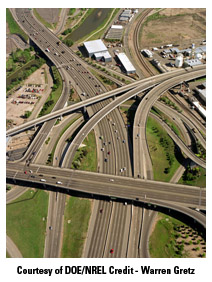 The Fish and Wildlife Service recognizes the critical role transportation plays in the economic and ecological well-being of human communities. Transportation projects influence the character of a region by the number of people and the type and amount of goods and service that it transports. Transportation designs can influence the plant, fish and wildlife habitat and the ecological health of the United States. The Service encourages the design of transportation projects that provide the greatest value to the greatest number of people while avoiding or minimizing impacts to habitat and to the disruption of the ecological processes that naturally sustain these areas. The Fish and Wildlife Service recognizes the critical role transportation plays in the economic and ecological well-being of human communities. Transportation projects influence the character of a region by the number of people and the type and amount of goods and service that it transports. Transportation designs can influence the plant, fish and wildlife habitat and the ecological health of the United States. The Service encourages the design of transportation projects that provide the greatest value to the greatest number of people while avoiding or minimizing impacts to habitat and to the disruption of the ecological processes that naturally sustain these areas.
The Service's Conservation Planning Assistance Program develops policy and products to help facilitate and guide the agency's role in transportation planning. The Conservation and Planning Assistance Program does this in a variety of ways. By gaining a better understanding of local transportation needs, the Service provides technical information that enables State Departments of Transportation and local transportation planning organizations to develop alternatives with minimal environmental impacts. Through a streamlined environmental review process, Service participation in transportation planning includes:
- Involvement in statewide/metropolitan planning process or State transportation plans (STPs);
- Sharing information on current events and issues related to environmental protection and transportation planning;
- Identifying and promoting innovative practices that protect natural resources;
- Identifying and promoting innovative practices that streamline the environmental review process; and
- Promoting partnerships with other Federal, State, and local governments and non-governmental organization to address the efforts above.
To find out more about Conservation Planning Assistance Program activities related to transportation projects, you may wish to visit the following sites:
Environmental Stewardship Excellence Award
The Environmental Stewardship Excellence Award is awarded every 2 years to Service employees or offices that use partnership-based approaches to promote ecosystem sustainability while meeting the increasing transportation needs of the Nation.
The Fish and Wildlife Service encourages nominations from any person, including any of our many partners within the transportation planning community, such as the Federal Highway Administration (FHWA); a State Department of Transportation or natural resource agency; regional or local government; or non-governmental organizations, and internally from other Fish and Wildlife Service peers.
Nominees are reviewed by a panel of judges who evaluate the nominations and make a recommendation to the Service. The judges are selected to represent the American Association of State and Highway Transportation Officials (AASHTO), the Association of Fish and Wildlife Agencies (AFWA), the Federal Highway Administration (FHWA), and include a local government transportation planning representative. The Assistant Director - Fisheries and Habitat Conservation, in consultation with the Assistant Director - Endangered Species and the Assistant Director - Federal Assistance will make the final award decision. The award winner will be notified and invited to an award ceremony in Washington, D.C. on or near Earth Day. The name of the award winner is also inscribed on a permanent plaque located in the Service’s Washington Office.
|
|